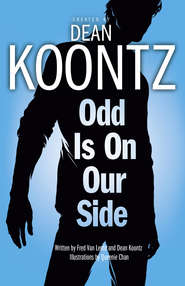По всем вопросам обращайтесь на: info@litportal.ru
(©) 2003-2025.
✖
Jane Hawk Thriller
Автор
Год написания книги
2019
Настройки чтения
Размер шрифта
Высота строк
Поля
Assuming Lucky O’Hara had earlier enjoyed a lunchtime rush, now at three thirty-five the crowd had gone. Two retirees sat at the horseshoe bar, each alone, one of them in low conversation with the bartender. A young couple engaged in an intense discussion in one of the booths that lined both side walls. The tables at the front of the room were not occupied. Jane sat at a window table for two, with a clear view of the motel that stood across the street and somewhat west of her position.
If the owner and staff and primary clientele of Lucky O’Hara’s had once been Irish Americans, that seemed no longer the case. The waitress who took Jane’s order—two hamburger steaks, one atop the other, hold the hash brown potatoes, add extra vegetables, a side of pepper slaw, a bottle of Corona—was a pretty blond-haired black-eyed girl with a Bosnian accent.
The pilsner glass was frosted, the Corona ice cold. Properly chilled beer was one of the humble pleasures that kept her in a positive frame of mind during this ordeal of threat and violence. A hot shower, a piece of favorite music, the fragrance of a flowering jasmine vine growing on a trellis, and countless other little graces reminded her of how sweet life had once been and could be again. As motivation, a desire to live well and freely again was second only to her fierce determination to keep her child safe and to give him a future from which those who would enslave him had been eradicated.
She watched the motel during lunch. Red curb restricted parking to the farther side of the street. There were no paneled vans that suggested surveillance. No obvious sentry slouched in any of the cars or SUVs.
A few doors south of the motel, overdressed for the mild day in layers of ragged sweaters and a black-and-green tartan scarf, masses of hair and beard bristling as if fossilized in that configuration following an electric shock, a vagrant sat on the sidewalk, his back against the wall of a vacant storefront. Beside him stood a shopping cart in which were heaped large green trash bags bulging with whatever eccentric collection constituted his treasure.
Such a disguise was within the repertoire of a true stakeout artist. The vagrant was the sole subject of Jane’s suspicion—until he got to his feet, stepped to the recessed entry of the building, dropped his trousers, and defecated. Although a federal agent on such an assignment would take pride in the exactitude of the details of his costume and behavior, he would not feel obliged to take a dump in public for the sake of authenticity.
Glittering in the sunlight, traffic passed in riotous variety. Jane could not detect any vehicles repeatedly circling the block in a rolling surveillance of the motel.
The appearance of normalcy at Counting Sheep concerned her. When nothing whatsoever in a scene looked suspicious, when it seemed picture-postcard serene and downright churchy, it was at such high contrast with everyplace else in this fallen world that you had to wonder if it was a setup. She had developed measured paranoia as a survival trait not just since going on the run, but from her years in law enforcement.
She spooned ice from her water tumbler into the pilsner glass to chill the remaining beer, finished lunch, eyed her watch—4:33—ordered another Corona in a chilled glass, and asked for the check.
She paid and tipped 30 percent as soon as the beer arrived, so that when she took another hour, the waitress wouldn’t worry that maybe she would skip out on the check. She said, “The bastard was supposed to be here when I arrived. I’ll give him another hour to hang himself.”
Whether she had acquired her cynicism in Bosnia or California, the waitress bluntly said, “Dump him.”
“I keep saying I will, but I don’t.”
“Girl like you has options.”
“So far none better than him.”
“They play too much video game.”
“Who does?” Jane asked.
“This generation men. Video game, porn, Internet—they don’t know how to be real anymore.”
“Prince Charming is dead,” Jane agreed.
“Not dead. Just lost. We need to find. You can’t find when you won’t look.”
“Maybe you’re right. Do you keep looking for him?”
“I look, I hope, I date—but always with knife in purse.”
“Really? A knife in your purse?”
The waitress shrugged. “Is L.A. A girl can’t take chances these days.”
Jane nursed the second beer through another hour, watching the motel while pretending to be waiting for Mr. Wrong. The homeless man with the shopping cart moved on to defecate elsewhere. The elastic shadows stretched eastward. The traffic quarreled in greater volume through the street, as if there were no other avenue in all the world, every traveler bound frantically for the same and perhaps terrible place. Counting Sheep continued to represent itself as innocent and safe.
Excessive hesitation was the mother of failure. Winning required considered action. Get off the X. Move.
She returned to the motorcycle parked on the side street. She cruised around the block, pulled into the motel lot, and parked in front of Room 5, two doors north of the unit in which she’d left her luggage.
No one was currently in the immediate vicinity. If she was a figure of interest to someone, he might be watching her from behind a window, through parted draperies.
She took off her helmet, left it on the seat of the Big Dog, and went boldly to Room 3.
High situational awareness. In Condition Yellow. No eyes in the back of her head, but alert for any sound that didn’t belong in the basketweave of street noise.
She keyed the door and pushed, and it swung into a coolness of shadows, revealing the furniture as colorless shapes in the gloom.
Before crossing the threshold, she slid her right hand under her sport coat, to the grip of the pistol in her shoulder rig.
Warily, she glanced back at the parking lot, at the street, at the motel office to the south. Nothing.
A single-file succession of fat crows, eerily silent for their raucous kind, passed low overhead. Crisply defined shadows, blacker against the pavement than the birds were black against the sky, glided past her feet, as if to encourage her to flee with them.
She was not Jane Hawk. She was Leslie Anderson. If her pursuers knew about the Anderson ID and this motel, they would have come for her in this place rather than at the library. Somehow they knew about the car, but only the car.
She entered, closed the door, switched on lights. A housekeeper had been here. The bed was made. The fragrance of an orange-scented aerosol freshened the room, though under it lay the faint lingering staleness of marijuana smoke from some previous guest. The door to the small bathroom stood open wide, and a frosted window admitted enough light to reveal that no one waited in there.
All seemed the same as when she had checked in the previous afternoon. Nonetheless, she sensed a wrongness in the room that she could not define.
Two sliding mirrored doors served the closet. As she approached them, she looked not at her image, but at the reflection of the room behind her, which seemed somehow strange and not an exact likeness, as if a threat thus far invisible might materialize from some dark dimension suddenly folding into this one.
Engine noise swelled as a vehicle pulled off the street and into the motel lot. She focused on the room door reflected in the mirror before her. The engine died. A car door slammed. She waited. Nothing.
Sometimes in the deep of night, when the sleeper’s fantasy is benign—a golden meadow, an enchanting forest—anxiety arises with no apparent cause, just before the dream is invaded by men without faces, whose fingers are razor-sharp knives. Her disquiet now was akin to the dreamer’s apprehension, the cause intuited rather than perceived.
As she slid the left-hand closet door to the right, it stuttered slightly in its corroded tracks. Her two suitcases were gone. She pushed both doors to the left. The other half of the closet also proved to be empty.
She drew the Heckler & Koch Compact .45 and turned to the room, which had taken unto itself the strangeness that she had previously perceived only in the mirror, so that every mundane object seemed to have an alien aspect, malevolent purpose.
The bathroom window was too small to serve as an exit. The room door offered the only way out.
Draperies with blackout linings covered the window to the left of the door. She would gain nothing by parting those greasy panels of fabric to see what awaited her outside. Whatever it might be, she had no choice other than to go to it.
Pistol in hand but held under her sport coat, she opened the door. After the lamplit room, the sun-shot world made her squint. She stepped outside.
The Big Dog Bulldog Bagger had disappeared. To her left, in front of Room 1, under an ill-kept phoenix palm, stood the metallic-gray Ford Explorer Sport that she had abandoned at the library several towns from here.
Neither of the exits from the motel parking lot was blockaded. No cops. No plainclothes agents.
All seemed counterfeit, as if the street were only a movie set on a studio backlot.
In the new world aborning, reality seemed frequently displaced by virtual reality.
Most people were so enchanted by high technology, they didn’t see its potential for oppression, but Jane was aware of the darkness at the core of the machine. The current culture deviated radically from previous human experience, ruthlessly reducing each woman and man to mere political units to be manipulated, balkanizing them into communities according to their likes and dislikes, so everything from cars to candy bars could be more effectively marketed, robbing them of their privacy, denying them both a real community of diverse views and the possibility of personal evolution by censoring the world they saw through the Internet to make it conform to the preferred beliefs of their self-appointed betters.
In such a world, there were daily moments like this one at the Counting Sheep Motel, across the street from Lucky O’Hara’s Bar and Grille with its smiling leprechaun and pot of gold, situations that felt unreal, that suggested the world had come unmoored from reason.











